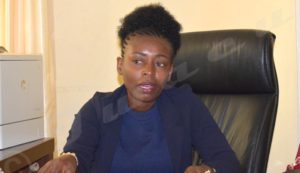The Security Council adopted the resolution (S/RES/1325) on women and peace and security on 31 October 2000. How far is the implementation of this resolution in Burundi after eighteen years?

Donatienne Girukwishaka: “Burundi registered 38% of women in the Executive, 46% in the Senate and 32% in the National Assembly”.
Donatienne Girukwishaka, Director General of women empowerment department, says there are still some challenges in the implementation of the resolution 1325 despite the significant improvements. “The first challenge is the lack of information on the resolution. It is not known, there is a need to sensitize everybody to the importance of the resolution “.
She says, however, that Burundi has made a significant step in the implementation of the resolution. “In 2012, Burundi developed the first five-year National Action Plan (NAP) for the implementation of the Resolution 1325”.
Mrs Girukwishaka says the first action plan was made around 8 main focuses. “The effective participation of women in the process of peace negotiation and peacekeeping operations, equality and equity in the participation of men as well as women in decision-making positions. It also focused on strengthening the mechanisms for protecting women’s rights in conflict and post-conflict periods as well as the legislative reforms in favor of gender equality”.
She says the second action plan (2017-2021) is centered on 6 points. “These include protecting the rights and care of SGBV victims, involving women and taking into account the needs of women and girls in the development and implementation, monitoring and evaluation of post-conflict programs. In addition, it provides for the financing, coordination, monitoring and evaluation of the implementation of the action plan,” says Mrs. Girukwishaka.
She also says with the 2010 elections, Burundi entered its second post-conflict .legislature with new institutions in which women are well represented than before. “After these elections, Burundi registered 38% of women in the Executive, 46% in the Senate and 32% in the National Assembly”.
The resolution 1325 urges all actors to increase the participation of women and incorporate gender perspectives in all the United Nations peace and security efforts. It also calls on all parties in situations of armed conflict to take special measures to protect women and girls from gender-based violence, particularly rape and other forms of sexual abuse.



















 IWACU Open Data
IWACU Open Data

